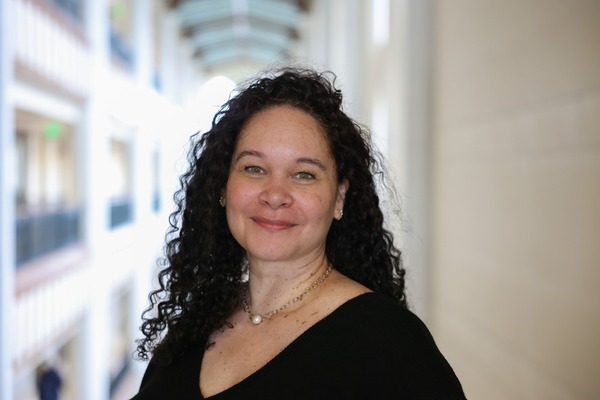
L. Arielle Phillips, associate dean of collegiate affairs for the University of Notre Dame and associate professor of the practice in the Department of Physics & Astronomy, has been named a Simons Emmy Noether Fellow, giving her the opportunity to work as a visiting scientist for five months at the Perimeter Institute for Theoretical Physics in Waterloo, Ontario, Canada.
The fellowship is targeted toward mid-career women in physics who may have several professional obligations, and allows them the time to delve fully into their research interests. Visiting scientists gain the opportunity to pursue their work in the company of an international group of peers.
“I’m very excited about it,” Phillips said. “It was kind of a dream to get one of these fellowships when I first learned about it two to three years ago; I visited Perimeter last year for a week, and was extremely productive during that time.”
Phillips’ research into the large-scale structure of the environment in which galaxies form and evolve uses a number of large scale computer simulations. Because her work is computer-based, Phillips plans to continue a number of projects she has started with her graduate students, two of whom will visit Perimeter for two weeks while she’s there.
She also plans to focus on completing grant applications and working on a new research question she has been wanting to investigate, but hasn’t yet had time.
“One aspect to going to a place like (Perimeter) is that focused research time we will have, surrounded by really amazing people who are thinking about their own passions,” Phillips said. “This is more than likely going to lead to some new avenues of research . . . and that's also very exciting.”
The Simons Emmy Noether Fellows Program, supported by the Simons Foundation, honors the work of Emmy Noether, a German mathematician whose work in the field of abstract algebra underpins much of modern physics. The Perimeter Institute launched in 2000, the brainchild of Mike Lazaridis, founder of Research in Motion — the former BlackBerry mobile device company (renamed BlackBerry, which now specializes in cybersecurity). He created the institute after realizing that most of today’s technologies began because of breakthroughs in theoretical physics. The building opened in 2004.
“There are a large number of little nooks and crannies in the building with fireplaces and blackboards where you just meet with other people,” Phillips said. “While there are more formal meeting rooms, there are several more casual spaces, and you’re encouraged to have casual encounters that allow you to think and talk about your science in a more relaxed atmosphere.”
Phillips said she is especially grateful for the support of Santiago Schnell, the William K. Warren Foundation Dean of the College of Science, who helped with the logistics of clearing her schedule of work she does as associate dean. Duties of that position are being completed on an interim basis by a few others who already have full-time schedules, including David Veselik, assistant dean for undergraduate advising, and Associate Teaching Professor Dana Lashley.
“This really speaks to the institutional effort involved in making sure that this fellowship can happen,” Phillips said. “This is going to be a wonderful experience for me, but it wouldn’t be possible without all that work — we really distinguish ourselves among other institutions by supporting our researchers in this way, and I’m very grateful to Dean Schnell.”
She plans to return with several completed projects and new ideas to share, and a feeling of renewal for her work.
“There's this effervescence that you feel in your brain when you're in a state of mind and in conditions that are supporting your research; when you have enough time to make the connections you need to make,” she said. “I felt that at Perimeter; that place is tailor-made for this type of experience.”